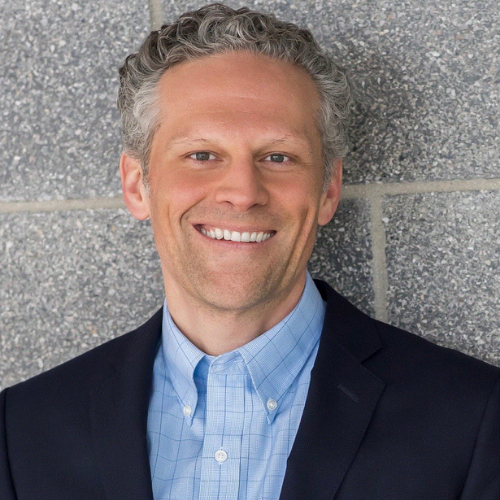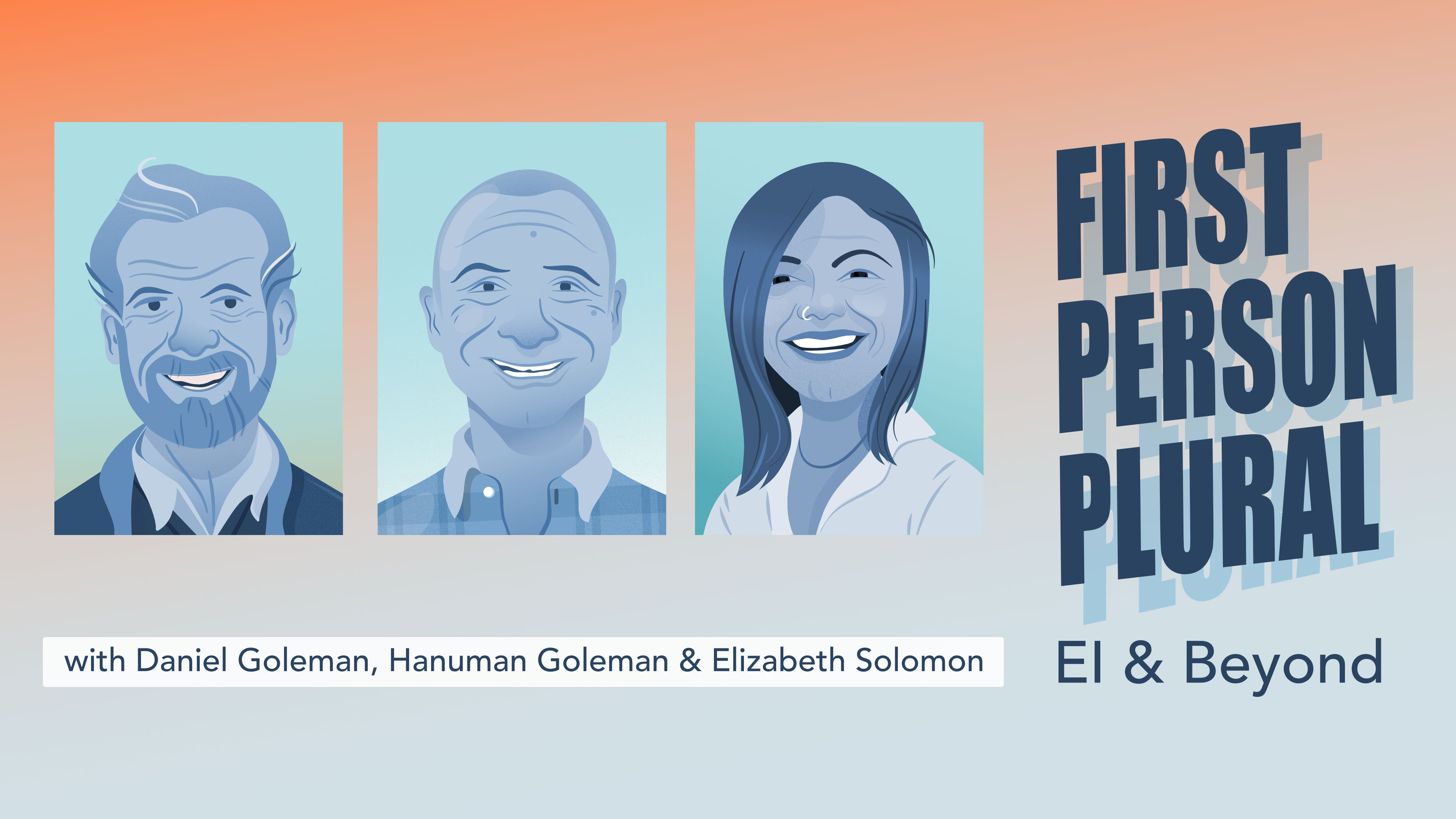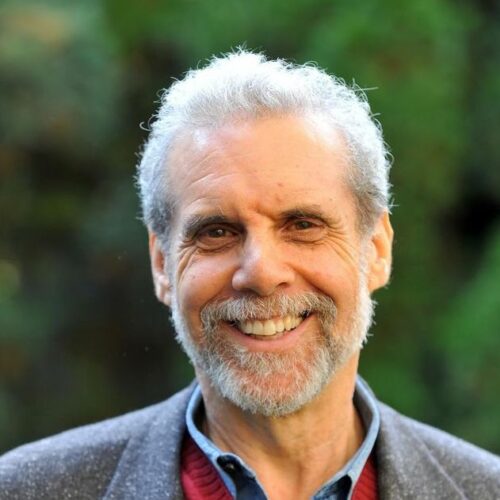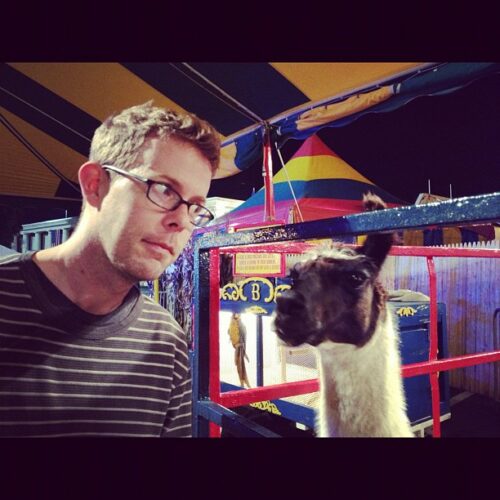
S1E5 Self-Awareness: An Honest Look In The Mirror
What happens when your team is failing and it turns out…the problem is your own leadership style?
In Today’s episode, Daniel Goleman speaks with Executive Coach Matthew Taylor. Matt shares a case study on Luke, a school principal who discovers that self-awareness is the first step towards improving employee morale, retention and overall effectiveness.
Our Guests
Matthew Taylor
Matthew Taylor is the founder and CEO of The Noble Story Group, bringing 1-1 coaching, team coaching, cohort training and coach training to coaches and C-level leaders in the business, non-profit, federal government, higher education, and K-12 education sectors. Matthew has coached and trained over 1600 leaders in his 5-Square approach that applies Daniel Goleman’s Emotional Intelligence Leadership Theory. Matthew is an ICF PCC-certified executive coach. He is also a founding faculty member, Meta-Coach, and curriculum developer for the Goleman EI Emotional Intelligence Coaching Certification Program (EICC).
Prior to his executive coaching career, Matthew was an award-winning international and urban public-school teacher and principal, founder of a school leader residency training program, and senior director of adaptive leadership for a large charter management organization. Matthew became an educator to close the opportunity gap and fight for racial and economic justice. He became an executive coach and trainer to support mission-driven leaders to reach their full potential and create the same transformational conditions for the people they lead.

Resources
The following resources were referenced in today’s episode:
- The Noble Story Group, unleash leadership potential through the power of emotional intelligence in order to promote sustainable, thriving communities.
- Learn more about Self Awareness in the Building Blocks of Emotional Intelligence: 12 Leadership Competency Primers by Daniel Goleman et al.
- From our blog: What is Emotional Intelligence?
- Primal Leadership: The Hidden Driver of Great Performance by Daniel Goleman, Richard Boyatzis and Annie Mckee
- Self-Awareness: Where Emotional Intelligence Begins by Emotional Intelligence Correspondent and Producer, Elizabeth Solomon
- Support our podcast by becoming a monthly Patron.
Subscribe to the podcast:
Subscribe now and sign up for our newsletter to get notified as new episodes are released.
Have feedback? We want to hear it! Submit a Voicemail.
If you enjoyed today’s episode, please rate our show and submit a review. It helps us spread the word about the show.
Episode Credits:
This show is brought to you by our co-hosts Daniel Goleman, and Hanuman Goleman and is sponsored by Key Step Media, your source for personal and professional development materials focused on mindfulness leadership and emotional intelligence.
- Special thanks to Sujata, whose voices you heard at the top of the show.
- This episode was written and produced by Elizabeth Solomon and Gabriela Acosta.
- Episode art and production support by Bryant Johnson.
- Music includes Phase 2 by Xylo-Ziko
- Theme music by Amber Ojeda.
Transcript
Hanuman Goleman 0:01
Sujata What do you know about yourself?
Sujata 0:06
I know that I like care, and love, and I’m a loving creature and I like my flower I know that I do that. I like art and, and I like studying. I don’t know which one I’ll study but animals. That’s it for that question. And yeah, others.
Hanuman Goleman 0:31
What else can you tell me about your feelings?
Sujata 0:34
Oh my, I feel sad when my brother hits or punches me or pokes me in the eye. I know that it’s okay to feel emotion. I can feel happy when I just got a chocolate treat. I can feel happy when my brother gives me a flugan. It’s another way to say treat. I’m happy when my brother gives me a flugan.
Hanuman Goleman 1:03
He just made that word up?
Sujata 1:05
Yes, I’m happy when my brother gives me a flugan.
Hanuman Goleman 1:08
Well I like flugans too.
Welcome to First Person plural: Emotional Intelligence and Beyond. I’m Hanuman Goleman. And I’m back with our EI correspondent, Elizabeth Solomon. Hey, Liz.
Elizabeth Solomon 1:36
Hi, Hanuman. I’m really excited to be here with you today talking about self awareness. because this is such a critical component of emotional intelligence. You know, anyone who has read Dan’s work in emotional intelligence or studied it or you know, used it as a coaching framework, we know that in order to, you know, build ourselves in any of the other EI competencies, in order to get good at any of the other 11 competencies, we first have to have self awareness. So this is really, yeah, it’s the base of everything.
Hanuman Goleman 2:12
It really is. And sometimes even counter intuitively, like with empathy when on its face, we think that it’s really about understanding how others feel, and what they’re going through. And that’s true. But without self awareness, we don’t understand what those experiences are, we need to first recognize them in ourselves before we can recognize them in anyone else. In a similar way, how others perceive us can be a key insight into ourselves, I just reread the emotional self awareness primer that we published with Dan and his colleagues. And in it, Dan makes a point that I love, he says, the conundrum inherent in self awareness, is that when we are not self aware, we do not know it. Hmm. So how can we see our blind spots with the help of others, this is one of those counter intuitive places where self awareness can come from others from other people’s reflections, obviously, people you trust. And self awareness is also foundational for developing any competency. It lets us gauge our development. So we can tell when we’re getting better or worse at a competency. And without self awareness, we can’t be honest with ourselves or with others about ourselves. So yeah, emotional self awareness is a foundational emotional intelligence competency.
Elizabeth Solomon 3:41
Yeah, and I don’t know about you, but I always think, you know, developing self awareness, there’s kind of three levels that we can check in on. It’s the mental, the physical and the emotional, right. And so sometimes I use that as a framework, like a simple way to approach self awareness of just even understanding where we are in time. And space is just checking in with the body and saying, how is the body feeling? What are the sensations I’m feeling? What are the emotions that are associated with those? And what are the thoughts that are fueling some of those emotions? And we can learn a lot, I think by checking in on those three levels.
Hanuman Goleman 4:16
I love that. I’ve not quite thought about it like that. But each of those is a fantastic doorway into ourselves. And when we’re talking about this level of self awareness, we’re talking about what’s happening right now. And there’s never a wrong answer if you’re being honest with yourself. So right now, if emotions are predominant or really accessible, then that’s a perfect doorway. Or maybe it’s too much, and you need to find another way to be in the present moment. And so physical sensations like the breath are a little safer in that moment, when emotions can be overwhelming, but to have those three different doorways that you just talked about, into The present moment is a really wonderful framework. And the more we pay attention, the more we understand that those are all doorways to the same moment to this present moment experience.
Elizabeth Solomon 5:14
That’s really well put, and I think you’re speaking to something really important, which is finding the doorway where we can like stand in the place of the most objectivity and a moment, right, where we can just really be in that observer role. And kind of look at things from the outside in and observe ourselves on that meta level, because that’s really it’s really it’s hard to do. You know, the minute we observe something we often attached to it, we have a story about it, we have a series of emotions, what is it to be mindful? What is it to be present with what’s actually happening versus how we attach to it. And as many people know, mindfulness is a huge component of Dan’s work, right. And it’s kind of no wonder. It dovetails so well, with emotional intelligence, particularly this piece around awareness, awareness of self of our thoughts and our feelings, and our bodies.
Hanuman Goleman 6:05
Yeah, I think we should be really clear here. Because to me, it sounds like we’re talking about two different aspects of self awareness. And they’re both really important in different ways. Paying attention to our present moment, experience tells us how we’re feeling and reacting in the moment. It’s important information and cool stuff, like noticing our emotions in a moment tells us what we care about, right? emotions flair when we care about something. If we don’t care, meh, no big feelings. Awareness of our present moment experience is also the crucial factor in being able to catch a habit midstream, and be able to consciously choose another course of action. That’s when we stop ourselves from acting in ways we don’t want to, it’s really important. There’s also a level that’s a little wider of a view, it’s a more psychological story based view. It includes things like self reflection, and understanding how our actions impact others and ourselves. Both of these aspects are a part of this EI competency, emotional self awareness.
Elizabeth Solomon 7:13
Another piece I’m thinking about here is just this idea of like sovereignty and choice, right? It’s like self awareness gives us the ability to say, Okay, this is, you know, taking triggers as an example, this is something that triggers me, this is how I respond, right? And like, we get to make choices from that place of like, Okay, once I know that and understand that, and once I can see the pattern, I can make a choice to interrupt it, or I can make a choice to not interrupt it. But either way, I’m acting from a place of sovereignty and a place of decision.
Hanuman Goleman 7:44
Yes, this is where agency happens. This is where in any moment we take the reins of our life, we have that choice that you’re talking about.
Elizabeth Solomon 7:56
So Hanuman, this is a great segue into today’s interview, because here, Dan is interviewing Matt Taylor. And Matt is an executive coach who’s worked a lot in school systems, with school leaders. And this is also a great follow up to our last episode on social emotional learning, where we talked a lot about the implementation of emotional intelligence in schools, not just what that looks like for kids, but also what the school system, what the school leaders, the school administrators have to do to really successfully integrate emotional intelligence or social emotional learning into schools. So today, in this episode, when we hear Dan talk with Matt Taylor, Matt gives an example of exactly what we’re talking about right here, which is getting honest, like a moment of self awareness in his coachee, where he becomes aware of his impact on others, of how his behaviors are setting the emotional tone of his team, and of how things that he does and even like in his team are actually responses or reactions to his own behavior. And so he faces that choice point of what do I want to do about this? Now that I can see the pattern now that I’ve had a coach helped me see this pattern. Here’s Dan and Matt.
Daniel Goleman 9:17
Hello, this is Daniel Goleman. I’m best known for my work on emotional intelligence and leadership. And in this series, I’m looking at each of the 12 competencies in my emotional intelligence leadership competence model. today’s conversation will focus on the foundation competency, emotional self awareness. I’m speaking with executive coach Matt Taylor, to see how this applies to his work and leadership development. Hi, Matt, welcome to the podcast.
Matt Taylor 9:47
Hey, Dan, thank you for letting me be here.
Daniel Goleman 9:49
Let’s start by my reviewing the kind of official understanding of self awareness and see where this particular coached person fits in. Emotional self awareness has several senses. One is, you know your own emotions and their impact on your performance. You know what you’re feeling and why you feel it, how it helps or hurts what you’re trying to do. Then there’s a second sense of emotional intelligence. And that’s sensing how others see you. And knowing how you come off and having your own self image reflect that this is the kind of self awareness that’s picked up, for example, in whether or not there’s a gap between how you rate yourself on a 360, like the ESCI 360. And how other people rate you, the bigger the gap, the lower the self awareness. A third is that you have an accurate sense of your strengths and limits. This gives you a realistic self confidence across the 12, emotional intelligence competencies, you’d know where your strengths are, and you know where you have room to grow. Another meaning of self awareness is having clarity on your values, your sense of purpose, this lets you be more decisive when you set a course of action. I think that your case is going to fit. Number one, knowing your emotions and their impact on your performance leaders who are self aware this way, recognize when their emotions have a negative impact on their work, or when the people around them have a negative impact because of the way they’re leading. And that was pretty much the case with Luke, the principal you worked with. Could you tell us what you found with Luke?
Matt Taylor 11:33
Sure, absolutely. So I started working with Luke this fall, we meet a couple times a month, I think we’ve developed very good rapport. And so he’s showing up in this work vulnerable and ready to learn. And so he’s willing to go deep with me in terms of thinking about his emotions and his values. And Luke got some bad news. He got organizational health feedback back from his staff. And they reported that their morale and their feelings of positivity about working at the school were very low. And he was surprised. And so we started focusing our work on that, fortunately, I’d been in his school watching him lead a bit. And so I started asking him questions about well, you know, why do you think this is going on? What do you want to do about it? He said, Well, I think the problem is that we’re going into classrooms and giving teachers a lot of instructional and constructive feedback, but we’re not giving them positive feedback. And so my leadership team and I are going to start leaving positive feedback notes in every classroom at the end of our observations. And I said, well, what about your leadership team? What are you going to do for them, if that hadn’t occurred to him? So that was a new idea for him to start thinking,
Daniel Goleman 12:50
and in fact, you had been observing him in action. And you had seen a big discrepancy between how he was with one group and how he was with the leadership team. Can you talk about that discrepancy?
Matt Taylor 13:02
Sure. So he invited me to attend some of his leadership team meetings, which are largely focused on professional development. The first time I joined the team, I came in the room and sat down on the chair. And Luke didn’t even introduce me to the team, he jumped right into the meeting. And so immediately, I was aware of an emotion I was feeling in the room and kind of trying to gauge how other people were reacting to. And Luke, it became pretty clear to me is very skilled at the technical training of his people, in terms of building instructional leadership skills. But his approach that I noticed, was also very technical. He was asking a lot of kind of pointed and leading questions and his waiting to see whether his people would be able to give him the right answer or not. So what I noticed was, people were kind of on the edge of their seats,
Daniel Goleman 13:56
When you see the edge of their seats, not in a good way?
Matt Taylor 13:58
Not in a good way. They, you know, they seem to me to be very anxious about whether they were going to get the right answer. And so there was kind of this energy in the room that I felt that was, the teacher tried to get the right answer from the students and the students kind of sweating about whether they were going to be the one that was going to be wrong. And so there was a lot of this questioning that then led to Luke basically saying, Alright, here’s what you need to do. I’m going to model it for you. You’re going to practice it and go, and you’re going to go do it. And so, as we were debriefing these organizational health results, I said, You know, I said, Can I share with you, Luke, an observation that I made, about your meetings and about how they’re going. And so I shared with him, you know, the impression that I just share it with you. And it was kind of a surprise to him. He hadn’t thought about the how it felt in the room. He thought about trying to drive towards growth, but he hadn’t thought about how it felt. And I’ve, you know, I pointed out to him that he hadn’t introduced me, I pointed out to him that he hadn’t said hello to anyone or asked them how they were doing or how their days were going. So he thought, this is really interesting. Can you come and observe a one on one coaching meeting with one of my people? And so the next time we came in, I observed a meeting with Luke and one of his leadership team members. Again, I went in and you know, he didn’t introduce me jumped right in didn’t ask this person how they were doing that day. And I observed the same question and answer dynamic. And as we were walking out of the room, I decided to make some small talk with the leader, you know, asked him how he’s doing. It turned out it was his birthday. And so I said, Well, well, happy birthday that that’s, you know, how are you celebrating all of these things? And so when I sat down with the leader, he said, so what did you think? What did you see? And I said, Well, look for some he asked you, to your point, Dan, about core values. So what do you believe are the core conditions for your people being able to learn and grow? And through some questioning, he told me, I deeply believe that people need to feel supported, they need to feel trusted, they need to feel cared for and invested in and they need the space to try and fail if they’re going to learn. This was very surprising to me, based on what I see. So I, you know, I again, shared what I had seen, and I said, Did you realize it was your Dean’s birthday today? He said, Oh, yeah. You know, I knew that. I said, Have you have you mentioned that to him today? No, we hadn’t talked about it. So what do you think the impact was of that? The fact that you hadn’t the fact that I came in the room and sat down and you jumped into this, this is your first conversation of the day on this person. And he had to sit back and chew on that one for a minute. And I think that was when I really saw a light bulb starting to go off.
Daniel Goleman 16:56
So in other words, he had a blind spot. And the blind spot was how he treated his his closest direct reports. He knew how to tell them to be encouraging and positive with their direct reports with the teachers, but he didn’t do it himself with his own, and he didn’t realize that he had a totally goal oriented stance with them, here’s what you’re gonna do. Here’s how you’re going to do it. I’m going to show you how. This is known as the pacesetter style, right in our work, and it’s generally lowers morale, which is what he found out from the feedback when there was that organizational health report. So here’s a leader who does something all too many leaders do these days, which is to push people to get results, show them how they’re going to do it, be the model be aggressive, and not wait to have a relationship, not bother to know, what’s your birthday, not bothered to acknowledge it to celebrate. So he was very one sided, and unfortunately, was the wrong side. And given that you helped him see through this blind spot, how did you then help him improve?
Matt Taylor 18:09
Well, as the conversation continued, I brought him back to what he told me about his values, or what he deeply believed about learning and had him kind of hold up his behaviors or his you know, coaching, as he called it practice against those values. And that was when love really started is to be able to name, I’m saying that I value trust and feeling supported and investment in. But my behavior is actually modeling the opposite, that I don’t trust, that I don’t trust your ideas, and is modeling that I’m actually not invested in you. The other route I went with my questioning and had him try to unpack for himself is what did he really believe about his people. And he was able to name for himself. With this particular Dean, you know, I don’t feel like this Dean has the instincts to be a leader. I’m not confident that they’ll be able to learn what it takes. And so, you know, my questioning, pushed him to think about what the impact of his coaching had on that person that might give him some conflicting data. Or that might actually be a self fulfilling prophecy here. And what Luke realized was, what I’m seeing may actually be a direct outcome of my lack of trust.
Daniel Goleman 19:32
Exactly. That’s exactly right.
Matt Taylor 19:34
Yes. And so the light bulb went off,
Daniel Goleman 19:37
the light bulb went off. And what he realized, if I understand is that he was giving a very demoralizing message. I don’t believe in you. You don’t have what it takes, you’re going to fail.
Matt Taylor 19:50
Right? And actually, it was his behavior that was actually causing the other person to underperform. What is it that’s causing you to think this way about this person? So while he’s getting the wrong answers, he’s, he seems really nervous. And he doesn’t seem to have much confidence. And again, I helped Luke kind of realize for himself that my behavior is causing that anxiety and lack of confidence. And so this was really helpful for for investing Luke, in pursuing a different kind of culture. And one that was more consistent with the values that he believed and what he believed about learning. Our first step then was for Luke to go and have a conversation with this person. I see, I need to kind of figure out whether this theory we’re coming up with here is true, and get some feedback from this person. And so the next time I came in, Luke was really excited. I said, Well, how did it go? He says, I have to tell you Matt, I didn’t know about I was about to lose this person. They’ve been looking for another job. When I shared my reflections and asked him for his feedback, he said, this is your leadership has felt like a waste of my time, and kind of a backward step in my professional development. And this really put Luke back on his heals. And so he was humble enough, and a learner enough himself, to ask more questions, and to think collaboratively with this person about what their coaching could look like, that would feel productive and create the right conditions for this person to learn. And so he came to this meeting with the list. That meeting we spent thinking about, what is it that Luke that you need to do both in your actions, but also kind of managing your, what we call this triggers that lead him to not trust and lead him not to be confident in this person? How are you going to manage these your behaviors and your triggers, so that you create these conditions that you really want to create?
Daniel Goleman 22:03
This is a really wonderful case example Matt because, you know, all change begins with self awareness, you couldn’t have gotten him to where you did. Without that big aha, oh, my blind spot, I’ve got to do something. I also realize you’re coaching a coach. And many coaches are without realizing it, because one of the main functions of a real leader is to help people grow and to help them develop to coach them. So here, it’s it’s very explicit, often it’s implicit, but it’s always part of a leaders role. And also, I’m struck by the fact that this Dean told him, his direct report told him, I’m looking for another job. This is a waste of my time. There’s data that’s coming out of Korn Ferry Hay Group on people with high and low self awareness. And they find one of the dimensions at which it matters the most is retaining people. People do not want to work for bosses that are low in self awareness, the reason being, that they don’t know, they don’t realize how they’re impacting people, they don’t read how their own behavior makes the other person feel, how it motivates, or demotivates. And also very interestingly, if you’re low in self awareness, you’re likely to be poor in all the other emotional intelligence competencies. This goes from, you know, self regulation, controlling your own emotions, your negative emotions, disrupting ones, or being too hard and driving for achievement without balancing that. That’s another common way in which people are we can emotional intelligence, or empathy or relationship building, as you point out, he didn’t even acknowledge this person’s birthday, which is, of course, something you that people love to have, they feel gratified, they feel known when you do that, and, and it creates loyalty. He didn’t do any of those things. So you’re able to help him see by showing him the blind spot. And actually, I like the fact that you let him come back to you with how he could improve. You didn’t make him you actually modeled being a good coach, you said, Well, here’s the problem. Now, what can you do about it, because that implicitly tells the person I believe in you, you can change you have what it takes. And apparently it didn’t, how things turned out with him?
Matt Taylor 24:24
It’s really amazing to see several weeks later, this leader that the principal is coaching, he’s recommended him to be in our principal and residence program. So he’s now moving towards becoming a principal. He’s got a lot of faith in this leader. And I think just as actually more importantly, he is trying to change the way he coaches all of his leadership team so that it feels more collaborative and feels like he’s honoring and valuing his team’s instincts and decisions. It turns out, it’s changing the way that these leaders are are coaching their teachers.
Daniel Goleman 25:03
method reminds me of some data that I’ve seen from another organization actually from the US Navy, where they found that if the commander of a ship was aloof, goal driven, hard to relate to distant, versus one that was emotionally intelligent, who was more interested in the group morale, motivation, relating to people and so on, the people who were more like, Captain queeg, very distant, and you can’t talk to them, and so on, had very poor performance. And those who had all emotion intelligence, competencies, their ships were high performing on the same objective measure. But what’s more interesting is there was a ripple effect, whatever style you saw at the top was repeated downward. So on the ships with the very goal oriented, impersonal, cold leader, at every level down, you found that and performance went down. And on the other hand, is you’re seeing here in your schools, in the organizations where the leader was very warm, very interested in encouraging people and so on, you saw that same positive style repeated on down through the ranks. And I would expect that to happen in these schools.
Matt Taylor 26:23
Absolutely. What we saw was not only did it go ripple down from the, you know, instructional leaders to the teachers, but it’s changing the way that teachers are working with kids, dramatically.
Daniel Goleman 26:34
I’m not surprised. I remembered data from a study that was commissioned by the United Kingdom Ministry of Education, where they looked at the head teachers, that’s the head leader in a school and looked at their style. And if that style was like this person originally was, they found that the students did very poorly on achievement tests, and controlling for demographics. If the leader was in a very positive emotional intelligence style, the kids did very well on the same achievement test. And what’s what’s different, there is the whole atmosphere created from top down right into the classroom. And you could say, in any organization, right into the office, right into the factory, right into this retail store, or whatever it may be. The leader really does set the term don’t they Matt.
Matt Taylor 27:25
Absolutely. I mean, I think you mimic what you feel.
Daniel Goleman 27:29
And you and also a leader is modeling what success looks like here. And you were saying how things went? And and do you have any metrics on this? Is there any way of actually getting feedback in an objective way on how this matters?
Matt Taylor 27:46
Sure, we are, fortunately have two more rounds of our organizational Health Survey. So we’re looking at the indicators of how people are feeling about their work environment, their perception of staff morale and their feelings about communication with leadership, to be indicators of whether the school is growing or not. We’ve had one more round, it’s still I think, pretty early in this principals evolution in this, but he’s already seen double digit gains in many of the indicators on our organizational Health Survey, including in positivity.
Daniel Goleman 28:19
Well, that’s fantastic. Thank you so much for that story. And that case, example. And congratulations, and thanks to you for the good work you’re doing.
Unknown Speaker 28:29
Well, thank you. It’s been my pleasure.
Hanuman Goleman 28:39
Something that I love about this story is that it offers perspective on how much we create our world. We see a world that is responding to us and that we are responding to really looking in a mirror our whole, like all the time.
Elizabeth Solomon 28:56
Hanuman, this piece about the mirror. I just experienced this this morning. You know, I got into like a quintessential power struggle with my seven and a half year old where we had 30 minutes to get out of the house and I said, get in the shower, and she said I don’t want to, right. And there we were locked. She was sitting on the beanbag chair and I was standing in the doorway. And I knew in that moment, especially after listening to this interview, I was like, Wow, my stance right now. My stubbornness, my insistence. I’m just generating the same in her right like we are in your classic typical power struggle. And actually, I’m the leader in this situation. I’m the parent and I’m the one who’s gonna have to break the pattern. And even with that awareness, it was so hard. It was like the instinct to push you know, even though I knew I was going to be met with push into to break that habit. And I thought to myself, yeah, there there she is mirroring back to me exactly, exactly the type of energy or stance that I’m coming at her with
Hanuman Goleman 30:02
showing her how it’s done.
Unknown Speaker 30:06
And then I’m like, I’m showing her how it’s done. And then I’m like, don’t do it that way. Like, what? What kind of message is that?
Hanuman Goleman 30:13
Like, don’t yell at people! When I’m locked with my kids, I noticed that a part of that is my own kid, my, my own ego, that’s just like, if I give up here, then I will be vanquished or I will be, I won’t exist or something. There’s like some, some deep part of me that is just holding on to winning for absolutely, just, I mean, I, I justify it by like teaching a lesson or some weird effed up like, thing like this twisted justification,
Elizabeth Solomon 30:57
what is the risk of walking away and letting go of the power struggle? Or what is the risk of giving up that stance of control in the moment?
Hanuman Goleman 31:07
It’s absurd. I mean, when the risk is zero, it’s not it’s not a, this isn’t a conscious, you know, thoughtful response. This is like, this is my kid responding to this kid. And so there’s an aspect of it, like, when two people are pushing against each other, they’re both full on in ego. And when one person can just like, relax that and allow… And there’s something about it, it’s like the safety to allow this to be happening, the safety to just I don’t need to win this, this, that doesn’t mean I’m this or that I can just let that be.
Elizabeth Solomon 31:56
Yeah, I think it’s also an awareness around where you’re motivated from right. So like, what’s the bigger goal in that situation? I was thinking about that this morning. I think, you know, parenting such a great example, because I’m like, my goal is to get her in the shower, so we can get out of the house on time. But all of a sudden, very quickly, there’s another little hidden goal under there, which is this hidden goal to be right, or this hidden goal, to assert exact get assert myself is the powerful person in the room. And it does take a moment of awareness to change that. And I remember thinking this morning when I was locked in that way of, okay, like I have the intellectual understanding that the best thing I could do right now is to lean into some sense of empathy in order to better influence her in order to better meet the larger goal, right. But that’s, I think, even where that body piece comes in, in order for me to actually do that, beyond just understanding that intellectually, I had to understand that my body was tense, that part of what I was experiencing was held in my physical experience, and that there was like, just some three deep breaths, and de escalating of my nervous system I had to do before I could even lead with the empathy and the influence. So one of the things that stands out in this interview is that Luke, Matt’s coachee, was seeing his team underperform. And you know, the narrative in his head was, they’re not doing enough, maybe I don’t have the right people on the team, right. And instead, what he realized was that it was his own approach, it was actually part of the narrative he was holding around them of that they couldn’t achieve, they weren’t going to grow, they weren’t going to change. That was inhibiting their performance. And so once he became aware of how his own approach to his team was creating that result, and shifted something in his approach, his experience of the team completely changed, their performance completely changed. And I think it’s often this way that actually there’s like, self awareness allows us to see what is that kind of small dial, that if we just turned it a little bit to the right, has a ripple effect, and can actually change everything about our reality, or what we perceive as our reality. And I also think, you know, what comes up in this interview that’s really interesting, they talk a little bit about and Dan mentions it, the ESCI 360, which is the emotional social competency inventory. And 360 assessments are amazing for helping us achieve greater self awareness. You know, we get to rate ourselves selves across these 12 competencies. And then we ask people all around us to rate us to, and we get to see in on the page through these wonderful bar graphs. Is there a gap between how I see myself and other people see me and in which areas do those gaps exist? Right. And I think it’s interesting to see where people might overrate themselves in comparison to the people around them. And then where people underrate themselves in comparison to people around them, which happens quite a lot.
Hanuman Goleman 35:08
One of the pieces that Luke’s story also highlights is that, as a leader, an important piece of self awareness is listening to others. And and that’s what you’re talking about with the esky as well, because no matter how self aware one is, it’s just vital to have that input. Because we are leading the entire organization, not just ourselves. It’s as if our leadership body expands. And the self awareness then comes from others in that organization as well.
Elizabeth Solomon 35:43
Yeah, I think it’s interesting to think about feedback to you, because there’s another role that self awareness plays there. And what comes to mind actually is thinking about, you know, my relationship, right, my my intimate relationship, which is that being self aware, enough to know the moments when we’re actually not open to feedback, and we’re not ready to hear feedback, and being able to communicate that kindly and effectively, and then being able to also know when we are open to feedback, so we can actively carve out space to receive it, right? I think sometimes there’s this idea that, you know, feedback is really positive. And it can just sort of be given willy nilly in any time space, you know, at the coffee machine, or whatever. And I think that what we know about giving good feedback is asking people like, Are you in a place to? Are you in a place to hear some feedback right now? And knowing for ourselves? Yeah, actually, I am or no, I’m not.
Hanuman Goleman 36:40
I’ve done exercises with various teams that I’ve been leading. And one important piece of the team building for me is finding out how each person likes to receive feedback. Some people don’t mind in the middle of a meeting being called out, and some people that will ruin their entire week, if they’re called out in a meeting. So just understanding like and, and it turns out, the people are really happy to let you know, and it’s a great way for the team to, to understand a little bit more of the human side of working together.
Elizabeth Solomon 37:18
Yeah, it’s great. I always say I tend to like a compliment sandwich. I’m like, I can take really hard feedback. But I just need it in a compliment sandwich. Like I just need to hear a little bit about my strengths going in and then following up on the feedback and it actually just better positions me to act on the feedback and respond.
Hanuman Goleman 37:36
I like my feedback, masked as praise. [laughs]
Elizabeth Solomon 37:45
Good to know about yourself. [laughs]
Hanuman Goleman 37:49
I’m just kidding. I actually Wish I got more feedback. It’s I feel like feedback is one of the like, the lack of feedback is one of the things that has kept me from developing as a leader as quickly as I would have otherwise.
If you’re interested in learning more about self awareness, and the other emotional intelligence competencies, go to our website keystepmedia.com. We have a set of 12 primers called the building blocks of emotional intelligence. Each of them is on a different EI leadership competency. That’s at a keystepmedia.com/shop.
Gaby Acosta 38:50
Thanks for listening to first person plural, EI and Beyond. Subscribe now and sign up for our newsletter to get notified as new episodes are released. This show is brought to you by co hosts Daniel Goleman and Hanuman Goleman and is sponsored by key Step Media, your source for personal and professional materials focused on mindfulness, leadership and emotional intelligence. Special thanks to Sujata, whose voice you heard at the top of the show, and today’s guest, Matt Taylor. For guest bios, transcripts and resources mentioned in today’s episode, check out our episode notes on our website firstpersonplural.com. This episode was written and produced by Elizabeth Solomon and me Gabriela Acosta. Episode art and production support by Brian Johnson. Music In this episode includes phase 2 by Xylo-Ziko and Theme Music by Amber Ojeda. Until next time, be well.
Transcribed by https://otter.ai

 https://noblestorygroup.com/
https://noblestorygroup.com/

 Apple Podcasts
Apple Podcasts Google Podcasts
Google Podcasts Spotify
Spotify




